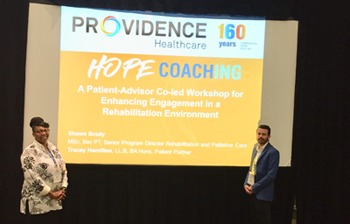For faster recovery, just add hope

By Amber Daugherty
In 2018, Tracey Hamilton had a stroke which left her with almost complete paralysis on her right side. After being confined to a wheelchair for six weeks, she became a patient at Providence Healthcare, where she underwent rehab to relearn basic functions including how to walk. While there, a family member asked one of the care providers what Hamilton would look like when she was discharged from the rehab program. They were told that she most likely wouldn’t be able to walk by then.
“I couldn’t let that just hang over my head,” Hamilton, a Patient and Family Partner, said. “Instead of being a source of discouragement, it bolstered my confidence and I declared then and there that I would walk out of there once I was discharged.
“There have been studies demonstrating that provider hope transfers to consumers and can be a positive motivator for positive change,” she said. “In my case, it seemed the hope transference went the opposite way and I was able to make a believer out of my rehab team.”

Hamilton defied expectations, recovering faster than anticipated. True to her word, she walked out of Providence on her discharge date without any assistive devices.
This October, Hamilton stood at an international conference and told the audience about how this experience led her to be part of Providence’s Hope Coaching program and how she’s helping share with health care providers the significance of providing hope.
“In the sessions we do, I introduce myself to the attendees – who can be nurses, social workers, physiotherapists, occupational therapists and more – and tell them my story,” she said. “I think when they actually see a patient and understand how solution-focused questions can impact recovery, it makes a big difference for them.”
The process of hope coaching involves creating small, achievable goals for patients – like standing on their own or taking a single step.
“Hope coaching is a key component of recovery and healing,” Hamilton said. “I think hope is essential to patients’ well-being at critical moments in their lives, when motivation will make or break the success of their recovery journey.”
Being able to present internationally on behalf of Providence was something Hamilton said she was grateful for.
“It wasn’t someone else telling my story – I was able to be part of this really unique experience,” she said.
“After we’d done the presentation, a few people approached me and one woman was just like, ‘Wow, I’m so amazed at your story,’ and another woman said she was going to tell her students about me. I’m really glad there are other people who had a takeaway from what we did – because giving people hope does mean a lot to patients – I’m proof of that.”
